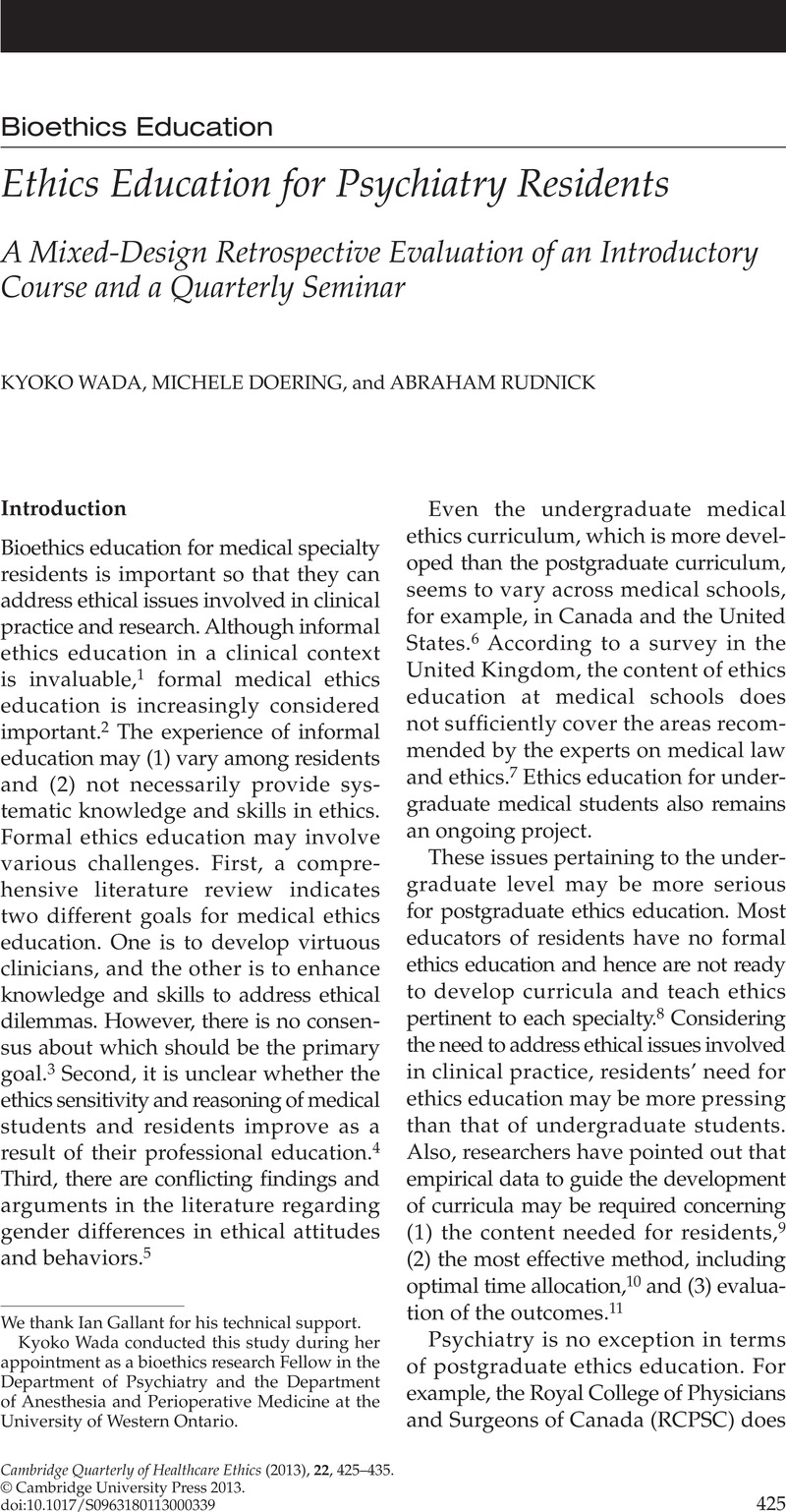A Mixed-Design Retrospective Evaluation of an Introductory Course and a Quarterly Seminar
Published online by Cambridge University Press: 06 August 2013

1. Hundert, EM, Douglas-Steele, D, Bickel, J. Context in medical education: The informal ethics curriculum. Medical Education 1996;30(5):353–64CrossRefGoogle ScholarPubMed; Roberts, LW, McCarty, T, Roberts, BB, Morrison, N, Belitz, J, Berenson, C, et al et al. . Clinical ethics teaching in psychiatric supervision. Focus 2003;1(4):436–44 (reprint from Academic Psychiatry 1996;20(3):176–88).Google Scholar
2. Forrow, L, Arnold, RM, Frader, J. Teaching clinical ethics in the residency years: Preparing competent professionals. Journal of Medicine and Philosophy 1991;16(1):93–112.Google Scholar
3. Eckles, RE, Meslin, EM, Gaffney, M, Helft, PR. Medical ethics education: Where are we? Where should we be going? A review. Academic Medicine 2005;80(12):1143–52.Google Scholar
4. Akabayashi, A, Slingby, BT, Kai, I, Nishimura, T, Tamagishi, A. The development of a brief and objective method for evaluating moral sensitivity and reasoning in medical students. BMC Medical Ethics 2004:29(5):E1.Google Scholar
5. McInerney, ML, Mader, DD, Mader, FH. Gender differences in responses to hypothetical business ethical dilemmas by business undergraduates. Journal of Diversity Management 2010;5(1):37–41.Google Scholar
6. Lehmann, LS, Kasoff, WS, Koch, P, Federman, DD. A survey of medical ethics education at U.S. and Canadian medical schools. Academic Medicine 2004;79(7):682–9.Google Scholar
7. Mattick, K, Bligh, J. Teaching and assessing medical ethics: Where are we now? Journal of Medical Ethics 2006;32(3):181–5.Google Scholar
8. Howard, F, McKneally, MF, Levin, AV. Integrating bioethics into postgraduate medical education: The University of Toronto model. Academic Medicine 2010;85(6):1035–40.Google Scholar
9. Goold, SD, Stern, DT. Ethics and professionalism: What does a resident need to learn? American Journal of Bioethics 2006;6(4):9–17Google Scholar; Fard, NN, Asghari, F, Mirzazadeh, A. Ethical issues confronted by medical students during clinical rotations. Medical Education 2010;44(7):723–30CrossRefGoogle ScholarPubMed; Wayne, DB, Muir, JC, DaRosa, DA. Developing an ethics curriculum for an internal medicine residency program: Use of a needs assessment. Teaching and Learning in Medicine 2004;16(2):197–201Google Scholar; Roberts, LW, Warner, TD, Green Hammond KA, Geppert CMA, Heinrich T. Becoming a good doctor: Perceived need for ethics training focused on practical and professional development topics. Academic Psychiatry 2005;29(3):301–9.Google Scholar
10. Helft, PR, Eckles, RE, Torbeck, L. Ethics education in surgical residency programs: A review of the literature. Journal of Surgical Education 2009;66(1):35–42.Google Scholar
11. Alfandre, D, Rhodes, R. Improving ethics education during residency training. Medical Teacher 2009;31(6):513–7Google Scholar; Schwartz, AC, Kotwicki, RJ, McDonald, WM. Developing a modern standard to define and assess professionalism in trainees. Academic Psychiatry 2009;33(6):442–50.Google Scholar
12. Royal College of Physicians and Surgeons of Canada. Accreditation Committee Discussion Paper—Biomedical Ethics; 2003; available at http://www.rcpsc.edu/residency/accreditation/positionpapers/Bioethics_e.pdf (last accessed 11 July 2011); Royal College of Physicians and Surgeons of Canada. Objectives of Training in Psychiatry; 2009; available at http://www.rcpsc.edu/residency/certification/objectives/psychiatry_e.pdf (last accessed 11 July 2011).
13. Bloch, S, Green, SA. Promoting the teaching of psychiatric ethics. Academic Psychiatry 2009;33(2):89–92.Google Scholar
14. See note 1, Roberts et al. 2003.
15. Tsao, CI, Guedet, PJ. Ethics and professionalism preparation for psychiatrists-in-training: A curricular proposal. International Review of Psychiatry 2010;22(3):301–5.Google Scholar
16. Lapid, M, Moutier, C, Dunn, L, Green Hammond, K, Roberts, LW. Professionalism and ethics education on relationships and boundaries: Psychiatric residents’ training preferences. Academic Psychiatry 2009;33(6):461–9.Google Scholar
17. Hoop, JG. Hidden ethical dilemmas in psychiatric residency training: The psychiatry resident as dual agent. Academic Psychiatry 2004;28(3):183–9.Google Scholar
18. Boyatzis, RE.Transforming Qualitative Information: Thematic Analysis and Code Development. Thousand Oaks, CA: Sage; 1998.Google Scholar
19. Knowles, MS, Holton, EF, Swanson, RA. The Adult Learner. 6th ed.Burlington, MA: Elsevier; 2005.Google Scholar
20. See note 5, McInerney et al. 2010.
21. Roberts, LW, Geppert, CM, Warner, TD, Green Hammond KA, Lamberton LP. Bioethics principles, informed consent, and ethical care for special populations: Curricular needs expressed by men and women physicians-in-training. Psychosomatics 2005;46(5):440–50.Google Scholar
22. See note 15, Tsao, Guedet 2010.
23. Clouser, KD, Gert, B. A critique of principlism. Journal of Medicine and Philosophy 1990;15:219–36.CrossRefGoogle ScholarPubMed
24. Bloch, S, Green, SA. An ethical framework for psychiatry. British Journal of Psychiatry 2006;188:7–12.Google Scholar
25. See note 24, Bloch, Green 2006.